Some people view yoga as a great way to practice mindfulness and connect with spirituality, which is true. However, yoga is also highly effective in sculpting your entire body, particularly your abdominal muscles, and helping you achieve a lean physique. Studies have shown that yoga offers both physical and psychological advantages that can aid in weight loss. Here, we share some key yoga moves recommended by a yoga instructor to help you work towards a trim waistline.
Yoga plays a crucial role in fortifying and supporting your core muscles, which work alongside your back to maintain spine stability during movement. This form of exercise is exceptional for enhancing core strength and balance.
According to Amelia Groves, a master trainer at YogaSix, yoga emphasizes the engagement of the core throughout various poses and transitions. She highlights that postures like boat pose directly target core muscles, but the overall practice of yoga involves moving from the center of the body, using internal support to build strength in the external body. By focusing on toning the pelvic floor and contracting the lower abdomen, individuals can develop the stability required for better balance, smoother movements, and enhanced muscle strength. This heightened awareness of core stability not only improves posture and muscle definition but also boosts endurance, strength, and control in physical activities.
We’re here with 10 of the best yoga moves to maintain a lean waistline and boost your fitness.
Cat/Cow
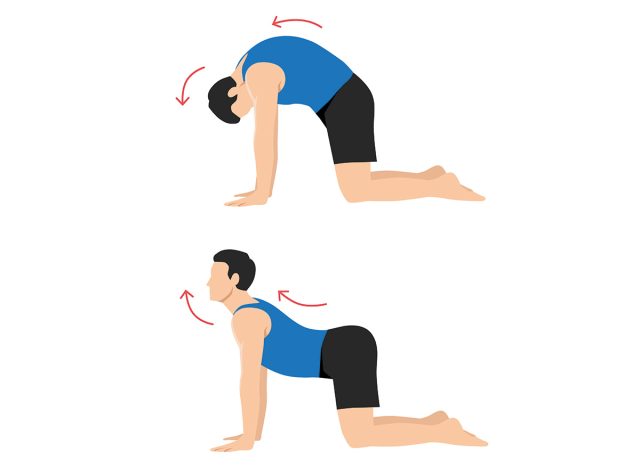
Begin this move in a tabletop position (on your hands and knees). Align your shoulders over your wrists and your hips over your knees. As you breathe in, lift your tailbone and chest. Breathe out, and arch your spine. Tuck in your chin, and bring your navel to your spine. Repeat this move eight to 10 times.
Bird Dog
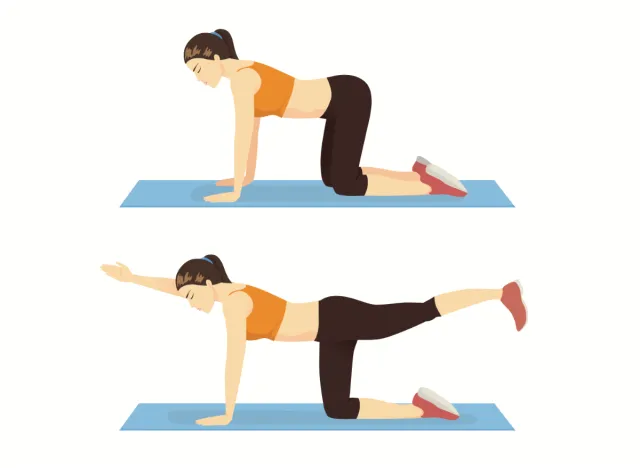
Start this exercise in a tabletop position (on your hands and knees). Align your shoulders over your wrists and your hips over your knees. Breathe in as you extend your right arm and left leg. Breathe out, and squeeze your elbow to your knee. Repeat this move five to 10 times on each side.
Plank
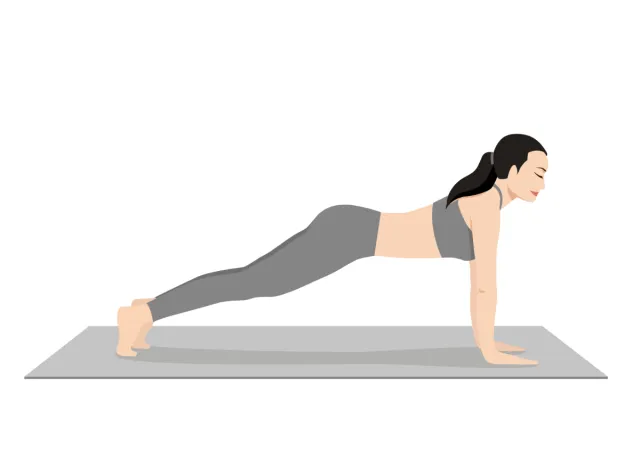
Once again, begin in a tabletop position. Bring one foot back, then the next, as you assume a high plank. Breathe in and press your weight away from the floor so your upper back forms a small “dome.” Breathe out as you activate your quads and core and bring your navel inward. Hold your plank for 30 seconds to a minute, and repeat three to five times.
Forearm Plank
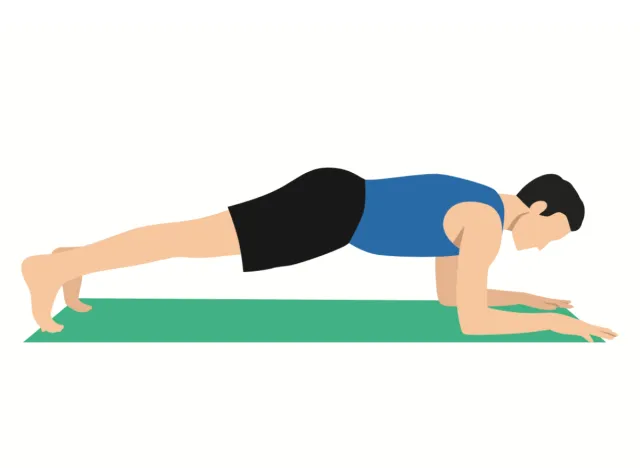
Begin in a high plank. Lower your forearms to the floor, one at a time. Breathe in and push into your forearms. Exhale as you activate your abs and bring your navel inward. Hold the forearm plank for 30 seconds to a minute. Repeat three to five times.
Side Plank
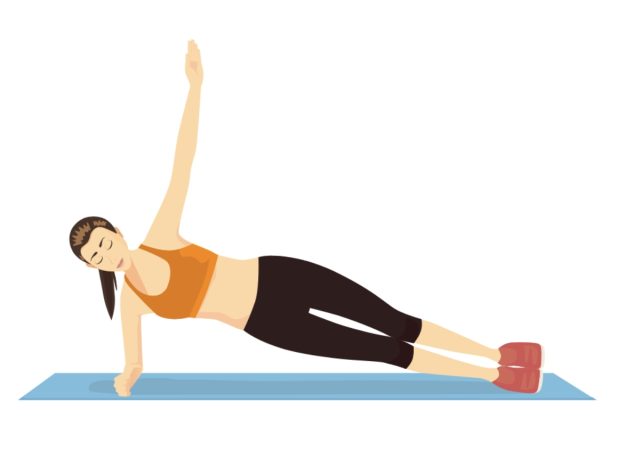
Lie on one side of your body with your legs extended and feet stacked, one on top of the other. Place your elbow or hand on the floor below your shoulder. Breathe in. As you breathe out, activate your core and lift your hips off the ground. Your weight should be supported by the hand or elbow on the ground. Hold the position for 15 seconds to one minute. Repeat three times per side.
Boat Pose
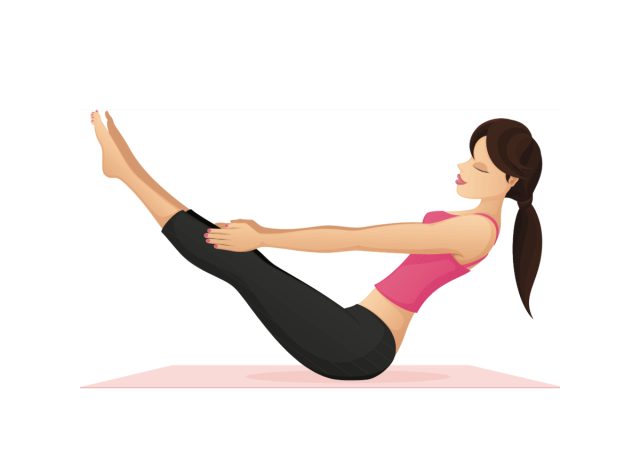
Begin seated tall with bent knees and your feet on the mat. Put your hands behind your knees. Breathe in as lift your chest. Breathe out and activate your core by bringing your lower belly inward. Breathe in and sit back on your sit bones. “Engage your inner thighs and back muscles and float your feet off of the floor to about knee height,” Groves instructs. “Hold here, or for more of a challenge, release your hands from your thighs and float your arms parallel to the floor. If you still want more of a challenge, try straightening your legs and bringing your biceps by your ears.”
Hold the position for five to 10 breaths, and repeat five times.
Chair Pose
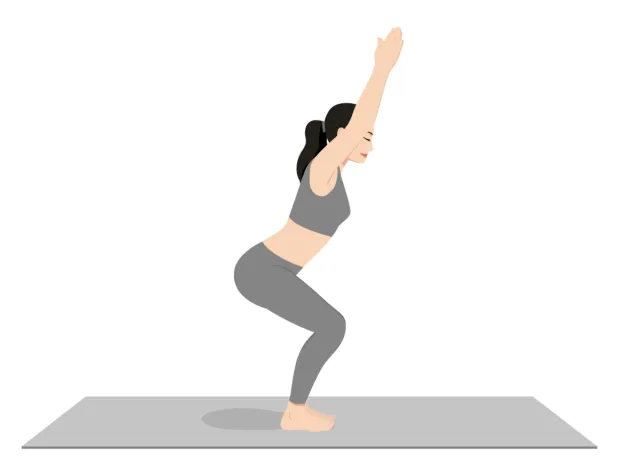
Begin standing tall with your feet placed hip-width apart. Breathe in and raise your arms to the height of your shoulders. Breathe out, bend your knees, and press your hips back like you’re about to sit in a chair.
“Inhale, lift your inner ankles by pressing the weight into your outer heels,” Groves instructs. “Exhale, shift your shins back to move the weight into your heels. Inhale, hug your inner thighs toward [each other] as if you were holding a block between them. Exhale, and draw your hip points toward your lowest ribs to engage your core and lengthen your tailbone. Stay or float your biceps by your ears, extending your arms overhead.”
Hold for five to 10 breaths, repeating three to five times.
Downward Dog Split Curls
In a tabletop position, line up your wrists under your shoulders. Spread out your fingers and firmly press into your hand. Breathe out and draw your fingers back together as you engage your hands to create a “dome” shape below your palm.
Breathe out, tuck in your toes, and bring your pelvis toward the ceiling. Breathe in as you pull your biceps forward and your triceps back. Your elbows should be pointed forward. Breathe out and soften your knees.
Breathe in as you push your rear end to the wall at the back of you and softly straighten both legs. Breathe in as you bring your right leg toward the ceiling. Breathe out and flex your foot while pointing all toes to the floor.
“Inhale, press back through your lifter heel like you are trying to put a footprint on the wall behind you,” Groves instructs. “Exhale, curl your knee to your nose, stacking your shoulders over your wrists. Inhale, extend your leg up and back. Exhale, curl your knee to your nose.”
Repeat the exercise five to eight times per side.
High Lunge
Begin in a downward dog split position. Breathe in and press through the heel that’s raised. Breathe out as you curl your knee toward your face. Press the floor away from you and take a step forward, bringing your foot between your hands.
“Hug in with your inner thighs to stabilize. Inhale, keep the deep bend in your front knee, stack your torso over your hips, and float your hands over your head,” Groves instructs. “Exhale, soften your back knee slightly and draw your hip points toward your ribs to engage your core and lengthen your tailbone. Keep that core engagement. Inhale, press back through your back heel to straighten your back knee and engage your quadriceps. Exhale, isometrically draw your feet toward each other to engage your inner thighs.”
Hold for five to 10 breaths per side.
Balancing Half Moon
Start standing at the front of your mat. Breathe in and take a wide step out with your right foot. Breathe out and rotate your front foot 90 degrees to point toward the front of your mat. Breathe in and bring your arms to shoulder height. Breathe out as you bend deeply into your front knee. Breathe in and lengthen your front arm as far ahead of you as possible so your back foot doesn’t have weight on it.
“Exhale, set your front hand on a block (set at its tallest setting) for stability as you simultaneously straighten your front leg and float your back leg off the earth,” Groves instructs. “Inhale, stack your top hip directly over your bottom hip, and spread your collar bones wide. Exhale, engage your lifted arm and leg to become light on your bottom hand, flex your lifted toes toward your face, and lengthen your tailbone toward your lifted heel. If you are comfortable here, turn your head to gaze at your top thumb.”
Hold for five to 10 breaths per side.
Frequently Asked Questions (FAQs) on Maintaining a Lean Waistline with Yoga
1. What are the benefits of yoga for maintaining a lean waistline?
Yoga offers a combination of physical poses, breathing techniques, and meditation that can help reduce stress, improve flexibility, and build core strength, which are all essential for maintaining a lean waistline.
2. How often should I practice yoga to see results in my waistline?
To see noticeable results in your waistline, it is recommended to practice yoga at least 3-5 times a week. Consistency is key to achieving and maintaining a lean waistline through yoga.
3. Can yoga help reduce belly fat?
Yes, certain yoga poses target the abdominal muscles and help in burning calories, which can contribute to reducing belly fat over time when combined with a healthy diet and regular exercise.
4. What are some effective yoga poses for a lean waistline?
Boat Pose (Navasana):
Strengthens the core muscles and improves balance.
Plank Pose (Phalakasana):
Engages the entire core and helps tone the midsection.
Twisted Chair Pose (Parivrtta Utkatasana):
Works the obliques and helps in trimming the waistline.
5. Is it necessary to complement yoga with other exercises for a lean waistline?
While yoga can be highly effective in maintaining a lean waistline, combining it with cardiovascular exercises like running or cycling can further enhance fat burning and overall fitness levels.
6. Can beginners also practice yoga for a lean waistline?
Absolutely! There are beginner-friendly yoga poses that target the core muscles and can help individuals of all fitness levels work towards a lean waistline. It’s essential to start at your own pace and gradually increase the intensity as you become more comfortable with the practice.
7. How long does it usually take to notice changes in the waistline with yoga?
The timeframe for noticing changes in your waistline with yoga can vary depending on various factors such as intensity of practice, diet, and individual body composition. Generally, consistent practice combined with a balanced diet can show results in a few weeks to a few months.
8. Can yoga help improve posture, which in turn can make the waistline appear leaner?
Yes, yoga helps in improving posture by strengthening the core muscles, lengthening the spine, and increasing body awareness. Better posture can create the illusion of a leaner waistline by aligning the body properly.
9. Are there specific breathing techniques in yoga that can aid in maintaining a lean waistline?
Yes, practicing diaphragmatic breathing and engaging the core muscles while breathing can help in toning the abdominal area and supporting a lean waistline. Incorporating pranayama (breath control) techniques in your yoga practice can have additional benefits.
10. What dietary recommendations can complement yoga practice for a lean waistline?
Along with regular yoga practice, maintaining a balanced diet rich in whole foods, fruits, vegetables, lean proteins, and healthy fats is essential for achieving and maintaining a lean waistline. Hydration and portion control also play significant roles in supporting a healthy waistline.






